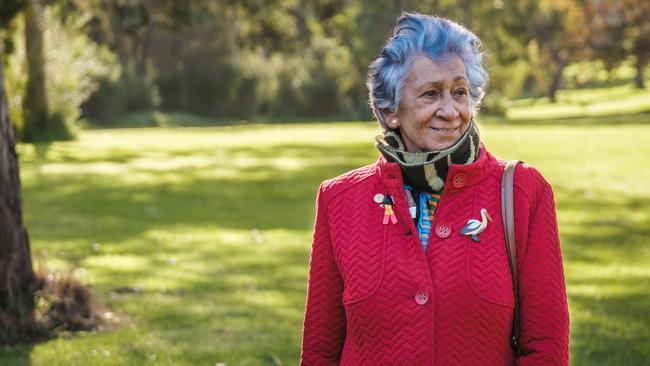Taungurung Land Council seeks oversight of essential services
Taungurung Land & Waters Council in central Victoria has told the state’s truth-telling body it wants to be a ‘Voice of Country’ and assume a role similar to the Essential Services Commission.
One of Victoria’s biggest Aboriginal land councils wants the power to oversee essential services on its traditional country, a localised ban on mining development and government support to counter public criticism of traditional owners.
In a submission to the Yoorrook Justice Commission’s land injustice inquiry, Taungurung Land & Waters Council (TLaWC) has issued a list of demands it says will “redress” the impacts of colonisation on its people.
The central Victorian land council, which covers the Goulburn River, Campaspe River, Kilmore and Benalla areas, is pushing the state truth-telling body to recommend the government give it the responsibility to oversee all natural resource management matters and give special rights over freehold land.
The proposal marks one of the biggest pushes for Indigenous influence since the failure of the voice to parliament referendum, and comes as Victorian Labor goes ahead with its path to treaty despite the Coalition withdrawing its support for the process.
The land council’s submission has called for it to be appointed as a voice of country for the Taungurung estate, and assume a similar regulatory role to Victoria’s Essential Services Commission, which oversees the energy, water and transport sectors.
The proposed statutory voice of country would have a “country controller” that assesses natural-management strategies, take enforcement actions and prepare compliance assessment reports and audits.
“In essence it would empower TLaWC to exercise responsibility for regulating and governing all decision-making by State agencies and related entities as to ensure that the health and long-term interests of Country are always prioritised,” the council said.
“Just as the work of the Essential Services Commission touches the lives of every Victorian every day, so the work of the Country Controller would have the potential to positively impact many aspects of life for every person living on Taungurung Country.”
The submission states the organisation is strongly committed to the proposal.
“It would not involve taking on all the functions of land administrations from the state,” the TLaWC says. “Rather, it would enable the Taungurung people, through their Corporation, to ensure Taungurung country is managed in accordance with Taungurung biocultural values and knowledge.”
The council has also asked for Yoorrook to lobby the Victorian government to legislate special rights for freehold title land owned by Indigenous corporations so that it cannot be repossessed by the state, be vulnerable to creditors or be subject to exploration or mining.
In addition, it is seeking to eradicate media reporting that could undermine public confidence in the “necessary process of redressing Indigenous land injustice”.
“We submit that Yoorrook might urge upon government the need not only to have a readiness to counter any negative reporting of rights and benefits accorded to traditional owners in Victoria – but also to do more to inform and consult with affected parties in the negotiation phase,” the submission said.
The TLaWC has also requested a high-level Indigenous advisory body to advise the Water Minister on planning for traditional owner rights of water, greater government investment for cultural preservation and the establishment of a land-acquisition fund for parcels of private land with cultural significance.

TLaWC argued that European invasion inflicted a “catastrophic assault” on its people and that land was currently “occupied and controlled by the invaders”.
“Prior to the European invasion, the Taungurung people occupied an area of over 2 million hectares centred around Warring (the Goulburn River) in what came to be called Victoria,” the council said in its submission.
“To describe this historic experience in terms of land injustice is to understate its magnitude. It was a catastrophic assault on Taungurung society – with entire clans utterly removed from the face of the earth, and the land that had been essential … being now under the full control of avaricious, and largely unsympathetic, newcomers.”
Yoorrook Justice Commission chair Eleanor Bourke said the organisation’s inquiry into land, sky and waters was ongoing.
“Yoorrook has spoken with over 3000 Aboriginal community members since it commenced, including receiving evidence from more than 800 First Peoples through submissions, roundtables and hearings,” Ms Bourke said.
“Yoorrook welcomes the Taungurung Land and Waters Council decision to make a submission. As the first formal truth-telling inquiry in Australia, Yoorrook is an opportunity for First Peoples to tell their whole story – and an invitation to all Victorians to listen and learn.”
Ms Bourke said the commission would develop its recommendations in response to evidence from roundtables, submissions and hearings.
She said commissioners met Premier Jacinta Allan last week to discuss “the ongoing importance of truth telling in Victoria”.
Victorian Nationals leader Peter Walsh revealed over the weekend that the opposition had changed its mind on supporting the treaty process. Mr Walsh told The Australian in October that he did not support the work of Yoorrook “so far”.
Ms Allan said the opposition’s U-turn on treaty would leave Indigenous communities to “pick up the pieces”.
“Victoria’s pathway to treaty with our Indigenous community has had, up until this point, important bipartisan support,” the Premier said on Monday.
“It’s well understood both on our experiences here in Victoria, but also too if you look around the world where countries and jurisdictions have established a treaty with their Indigenous populations, it means for better outcomes for the Indigenous community and for the broader population.”
She said the state’s Liberal leader John Pesutto must explain his party’s decision and accused the opposition of using its concerns around cultural heritage to “crab walk away from treaty”.
Mr Pesutto said he would focus on closing the gap while the Premier pursued treaty.
More Coverage
Yoorrook Commissioners met with Premier @JacintaAllanMP earlier this week to discuss the important ongoing work of truth telling in #Victoria.#firstpeoples#firstnations#truthtellingpic.twitter.com/l8osBeBrMq
— Yoorrook Justice Commission (@yoorrookjc) January 18, 2024






